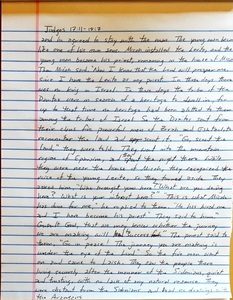- Home
- Daily Meditation
When a Step of Faith Feels Like a Kick in the Face

Judges 20:18-28
Synopsis Judges 20:18-28 7/24/2018
The Tent of Meeting was at Bethel at that time. So, the army of Israel inquired of God whether or not to fight against the tribe of Benjamin. The priest reported that they should. And, the army went out to fight.
Judah led the first charge. But, the Benjaminites routed Israel.
The soldiers went to Bethel and asked the Lord if they should attack a second time. They again received the word to attack. But once again, Benjamin routed Israel.
The leaders of the army wondered at what was going on. So, the soldiers inquired a third time. This time Phinehas , the High Priest, gave them the word of God. He said, “Attack, for tomorrow I will deliver them into your power.”
When A Step of Faith Feels Like a Kick in the Face
The tribal leaders had done everything they were supposed to do. They had inquired of the Lord. And they had offered animal sacrifices. They had received clear instructions through the High Priest. And yet, they failed.
The army of Israel lost twenty-two thousand men on the first day of battle. And they lost eighteen thousand died the second day. The losses didn’t make any sense. In obedience to God’s command, they attacked twice and were defeated both times.
So, how could they know what to do next?
Faithfulness in the Face of Defeat is Overcoming
It’s not intuitive to rejoice in the face of defeat. But defeat is the necessary evidence of perseverance. For, there is no overcoming without failures and setbacks. So, I’ll set my face like a flint knowing that once God has called for action, the victory is only a matter of time.
Consider it all joy, my brothers, when you encounter various trials, for you know that the testing* of your faith produces perseverance.” James 1:2-3
Discord in the Authentic Community

Judges 20:6-17
Synopsis Judges 20:6-17 7/23/2018
The Ephraimite man who had been abused at Gibeah of Benjamin, and whose concubine was murdered there, spoke to the tribal forces assembled at Mizpah.
The tribes judged Gibeah. And, the sentence was death to the criminals. They together committed to destroy the evil from Israel. So each tribe contributed one-tenth of their assembled forces and formed an army to attack the city.
But first, they sent men throughout the region of Benjamin, imploring them to give up the men who had committed the crime. However, the Benjaminites refused to turn the men over. And so, they sent soldiers to fortify Gibeah against any attack.
Digging In On Their Sins
So, it’s not clear why the Benjaminites sided with the criminals. In the past, people had committed egregious crimes. But there is no example of a tribe defending a guilty person. In fact, there were several prior historical examples of egregious crimes where the criminal’s home tribe made no effort to protect them. Here, there seems to be a defensiveness that is greater than the requirements of justice.
The book of Judges has a unique trajectory. It began with the Israelites all embracing the common culture described by the law of Moses. But, during the times when their enthusiasm for the Lord waned, the Israelites began to worship other gods. Then, they experienced oppression under the power of other nations. However, as time went by, the tensions between the tribes began to show up. As a result, civil unrest and eventually civil war seem almost impossible to avoid.
Discord in the Authentic Community
So how do I fit within the Authentic Community? And, how do I bring value? Is it mine to feed or to be fed? And, how do I love? What’s expected? And, what’s fitting?
Do I tend to divide or tend to unite? And, am I the cause of strife. Or, do I offend. Or, have I taken up the offense?
Jesus said there are two commands from the law that matter most: You shall love the Lord your God. And, you shall love your neighbor as yourself. Everything else hands on these.
The one God. And, the one church. And my commitment to these, that’s all the really matters.
Expel the arrogant and discord goes too; strife and insult cease. Prov 22:10
Denying the Blameworthy Brings Death

Judges 19:26-20:5
Synopsis Judges 19:17-25 7/22/2018
An Ephraimite man led his family on a journey from Bethlehem to the mountains of his tribal ancestry. Along the way, he was attacked in the city of Gibeah in the tribe of Benjamin.
The Ephraimite man had barely escaped death at the hands of the mob. In desperation, he gave his concubine to the mob in order to save his own life. The violence of the mob was sudden and horrific and fatal.
The next day, the man found her dead outside the door of his host. He picked up her body. And then, he placed it on a donkey and returned home. Once there, he dismembered her body into twelve parts and sent these to the leadership of each of the twelve tribes.
From both sides of the Jordan, every tribe sent forces. They gathered at Mizpah. Their intention was to make right the gross injustice.
How Did This Evil Thing Happen?
When the tribes came together, they asked one question. “How did this evil happen?” They were incredulous that such evil existed within the midst of the children of Israel.
This is one of the darkest and most discouraging chapters in the Hebrew scriptures. And shockingly, it shows the potential for depravity even amongst the “Chosen People”. This was an utterly evil act committed by people who actually knew about God.
At this moment, God’s project seems once again to be in serious danger. The Israelites of this age didn’t look very different from the story of Sodom and Gomorrah. So, the wickedness of the people remained, despite all of these tribes having the same common legacy.
Denying the Blameworthy Brings Death
I have done evil in my life. That’s a basic Christian claim. We’re not “all innocent”. As it is written, “Our sins are like filthy rags”. I injure my conscience when I sin. I’m especially not innocent. And no one, except God, knows my sins more than I do.
But, the good news is that I have options. If I confess my sins and repent, God will absolve me. I can be restored to right relationship. And thanks to the church, I have an assured means to do this.
The other option is to repress my sins. I can pretend that they didn’t really happen. Or, I can attempt to convince myself that the offense “wasn’t so bad”. But the guilt is like a plaque. And, despite the best advice of friends, the stain of sin doesn’t go away with time. Instead it wears on a human soul like the weight of an extra body. It takes increasing amounts of energy just to overcome the inertia of guilt that drags on every thought or desire – no matter for good or for evil.
“If we say, “We are without sin,” we deceive ourselves, and the truth is not in us. If we acknowledge our sins, he is faithful and just and will forgive our sins and cleanse us from every wrongdoing.” 1John 1:9
Groupthink: How Deep Does Depravity Go?

Judges 19:17-25
Synopsis Judges 19:17-25 7/21/2018
An older gentlemen, who happened to also be from Ephraim, invited a younger Ephraimite and his concubine into his house. Although the traveler had his own supplies, the old man made provision for him, and his whole group. He invited them to spend the night in his home.
As the evening grew into night, certain men from the city surrounded the house. And they demanded to meet with the traveler. They wanted to abuse him. But, the old man refused. The traveler pushed the concubine out the door into the crowd. She was raped and abused before being released. She crawled back to the residence where she died outside the door.
The Troubling Report
The troubling report of what happened to the traveler and his concubine is heightened by his unwillingness to stop in a foreign city for the night. He believed that the people from a kindred tribe would treat them better than would foreigners.
But, this episode describes an act of utter depravity. Much like the story of Sodom and Gomorrah, it gives insight into the depth of human depravity. This was a mob of Israelites. Their fathers had seen the glory of God in the Exodus. Yet, the wickedness of the group unhinged from the moral restraint associated with a fear of the Lord is breathtaking.
Groupthink: How Deep Does Depravity Go?
It would be nice to say that we don’t have this behavior in the modern world. But, of course, it would be a lie. If anything, it seems we grow in our capacity for injuring one-another. Human progress in forming technology has only leverage our basic motivations onto a larger scale. And so we seem to easily project our indifference onto not just small groups, but entire peoples and nations.
And the kernal of this iniquity is in the heart of every human person – certainly it is in mine. I have the capacity to enjoy the suffering of other humans beings. I have the ability to rejoice that some other “got what they deserved”. And, I have the ability to delight in the prospect of someone else’s failure. None of this is to my honor. All of it is to my shame.
But none of it catches God off-guard. Jesus knows well enough the extraordinary power with which He made me. And implicit in such extraordinary power is the potential for absolute abuse.
The call to destroy all evil will only really matter when I’m willing to work on myself.
“It does not rejoice over wrongdoing but rejoices with the truth.” 1 Cor 13:6
Family, Familiar and Who Can You Trust

Judges 19:7-16
Synopsis Judges 19:7-16 7/20/2018
A man from the tribe of Ephraim had a concubine from the tribe of Judah. She left him and returned to her father’s house in Bethlehem. After several months, the Ephraimite returned to Judah hoping to bring her back to his house.
Her father greeted him. And, eventually the woman was persuaded to go with him. The father-in-law made a days-long feast. On the day of their departure, he delayed their return until late in the day.
The delayed start caused the group to make limited progress. Despite his servant’s pleading, the Ephraimite man refused to spend the night in a foreign city. He pressed on until late in the day. The group arrived in Gibeah of Benjamin at the end of the day. No one spoke to them except an old man. He happened to also be an Ephraimite who lived amongst the Benjaminites.
Refused the Foreign City
There is a solace in being amongst the familiar. Whether or not the sense is justified, it feels safe.
The Ephraimite man had by-passed the opportunity to stay in a non-Israelite city. He was determined to remain in the anticipated safety and protection of his kindred. This was his bias formed on the basis of stereotype.
Family, Familiar and Who Can You Trust?
My natural tendency is to think that the familiar is safe. But the reality is, if I don’t really know, then I don’t really know.
The desire to feel safe causes me to project certain beliefs about other people that are, for good or for bad, stereotypes. The stranger may be less strange if I assume he is like me. But it’s an obvious mistake to think that people who look like me are my friends and those who don’t, are my enemies.
It may be true that it’s impossible to “not stereotype” because of the way our brains function. But I can overcome this limitation. I can quickly and deliberately become familiar with the stranger I just met. Or, I could take the time to speak with the person I think I know because I see them often – but to whom I’ve never really paid attention.
“Be hospitable to one another without complaining” 1 Peter 4:9
Arrested Development Nothing New Under the Sun

Judges 18:29-19:6
Synopsis Judges 18:29-19:6 7/19/2018
So, the Levite who had been the family priest for Micah, and then went with the Danites to Laish, was none-other than the grandson of Moses. He served as the local priest for the renamed city of Dan. His children also served as the priest for the Danites idol. They kept using the idol that Micah had made until the land went into captivity.
There was another man who lived in the remote mountains of Ephraim. He took a concubine from a woman born in Bethlehem. The concubine left the Ephraimite and returned to her father.
After several months the man went to Bethlehem to encourage her to come back. The woman’s father welcomed him. And they feasted for several days.
Moses’ Sons
Jonathan the Levite in the story is Moses’ grandson. There’s a shock to this revelation. Almost everything that takes place in the story is contrary to the law and the precepts that Moses taught.
He taught against making any idols yet Jonathan minstered before an idol made from silver. Moses taught against multiple places of worship, but the Danites created their own system of worship using a stolen idol.
It is intended as a snapshot of the depravity that the Israelites had fallen into only a few generations into living in the promised land.
Nothing New Under the Sun
It isn’t as though the scriptures paint a rosy picture of human nature absent the wisdom, power and forgiveness of God the Creator.
It’s a grim business. In the order of animals, one animal destroying another for food or defense strikes most people and natural – the order of nature. There is even a sort of beauty in the cycle of life.
But when human beings tear each other apart, it does not seem so. It’s unnecessary and brutish and beneath the dignity of man. It is a pitiable state of arrested development. Never hopeless but absolutely unnecessary.
So, there’s nothing new under the sun. This is how we are in the absence of God. Thanks be then, for the hope you find in Jesus Christ.
“And now, LORD, for what do I wait? You are my only hope.” Psalm 39:8
The Sham Things Which Are Not gods

Judges 18:19-28
Synopsis Judges 18:19-28 7/18/2018
The Levite who served as the family priest, saw the Danites steal Micah’s family idols. So, he questioned the Danites. In response, they strongly encouraged him to follow them. Then, they offered him the opportunity to be priest for the whole tribe. The Levite agreed.
When he realized what happened, Micah gave chase. He caught the Danites. But the Danites threatened to kill him and his family if he didn’t leave. So he left.
The Danites then went to Laish with the Levite. They conquered the city.
The Sham Things Which Are Not gods
Micah wanted desperately to get his expensive idol back. It was an heirloom. And, it was a part of his legacy. And, it grieved him to lose it.
But contrast the people’s behavior around this idol with that of the authentic tabernacle at Shiloh. Men shuddered in fear at the thought of desecrating the holy place. Even the high priest could hardly imagine simply laying hold of the Ark of the Covenant with his bare hands.
And yet these men argued and nearly fought over the ownership of a false god. It begs the question, what power do they imagine is in this man-created object?
God Will Take It Away and That’s OK
I wonder sometimes. Why does God rip things out of my hands that I really want? And why does He allow others who are near me to have the very thing I want?
The things in my environment all have a moral implication. They have a value and meaning unto themselves that has been invested by God the Creator. And the things also have a relational value to me. They affect what I’m supposed to be doing. So, God brings things in and out of my life because each one has a purpose in the moment it is given.
So, a moment of grief isn’t undue when I lose something dear to me. But, on the other hand, if God takes something out of my life – there’s always a reason and it’s always good.
“Ill-gotten treasures profit nothing, but justice saves from death.” Prov 10:2
Taking Action in the Face of Reluctance and Fear

Judges 18:8-18
Synopsis Judges 18:8-18 7/16/2018
The tribe of Dan was looking for new territory to expand. They sent scouts who discovered a city in the northern most reaches of Israel. They sent a force to make war on the city of Laish.
The scouts led the soldiers on the same path north that they had taken when the reconnoitered the land. They stopped near Micah’s house. There, they made the decision to steal Micah’s sacred objects.
Act Quickly
“Are you going to hesitate?” This was the question the scouts asked the leaders of the tribe of Dan. Acting was absolutely necessary. But, they also recognized that there were risks.
But the circumstances were already set. This wasn’t a casual expansion. It wasn’t optional for them. The Danites had determined that they needed more land to support their people. New territory was fundamentally necessary. They acted without hesitation.
Reluctance, Fear and Uncertainty
My reluctance to take action is common. It is born out of fear and uncertainty. In my mind, I compare what I want to happen against the likelihood of failure. Basically, if the upside potential for getting some good is great enough, then I’ll act.
However, every proposed act that I might ever consider doing carries with it the risk that my plans won’t work out. And that uncertainty can be paralyzing.
The illusion is that “not acting” is an option with no downside. I think to myself, “if I don’t do anything, then at least I’ll keep what I have.” But the reality is there is also a risk in doing nothing. Keeping what I have may not be an option. And, hesitating also carries a similar risk.
Uncertainty doesn’t go away just because I avoid asking the question.
So, act. Make due diligence. Pray for God’s wisdom and favor. But then, act.
“For if anyone is a hearer of the word and not a doer, he is like a man who looks at his own face in a mirror.” James 1:23
Permanent Fail, Then Find Another Target

Judges 17:11-18:7
Synopsis Judges 17:11-18:7 7/15/2018
Micah offered a wandering Levite the full-time opportunity to serve as his personal priest. The Levite became like one of Michah’s family.
The tribe of Dan did not have sufficient land. The portion allotted by Joshua proved to be inadequate. So, the leaders of the Danites sent men out to reconnoiter the land. Their mission was to find a place in the Promised Land where they could expand.
As the Danites scouts went out, they spent the night near Micah’s house. Some of them recognized the Levite. So, they stopped at the house. And as they spoke, they learned how he came to be there. He told them about Micah. They asked for a blessing on their mission. And, the Levite blessed them and prophesied their success.
The Danites Needed Land
The Danites were not able to occupy the land they were given. Most of the tribes were assigned land that included mountains. But the tribe of Dan was assigned land on the central coastal plain. In this place, the Danites were vulnerable to Canaanite and Philistine chariots – so not all of the clans were able to sustain themselves there.
For this reason, the leaders of the tribe of Dan began a search for a different place to settle. Their scouts ended up identifying the area around Laish as a suitable place. The area was to the extreme north of Israel. The city had good resources. And, while the people were somehow related to the Sidonians, they were apparently too remote for Sidon to come and rescue when the Danites attacked. Also, the people there did not intermingle with the Arameans, so they lacked natural allies.
Permanent Fail, Then Find Another Target
Entering into the possibility of your life is not a one and done kind of thing. You can start out by thinking that the goals of your youth are the most important. And, if you achieve your goals, that’s great. But if you don’t, the tendency is to second guess your vision. And maybe, the tendency is to stop trying.
The Danites knew that God had promised them land. After a while, they knew that the coastal plains wasn’t going to work. So they looked for a more opportune situation on the borderlands.
Most really important success in life only comes through the process of trying and failing – and trying again. Water always flows downhill. Love never fails. You’ll get your heart’s desire if you don’t quit.
“Consider it all joy, my brothers, when you encounter various trialss, for you know that the testing of your faith produces perseverance” James 1:2-3
Chaos and Superstition and Relationship

Judges 17:1-10
Synopsis Judges 17:1-10 07/15/2018
Micah was a man from Ephraim. He apparently had taken a large sum of money from his mother, but then returned it to her. She consecrated a portion of the money. She sent this to a silversmith to make a household idol for the family. Eventually, Micah chose one of his sons to serve as a priest. He ministered before the religious articles he had made, including the idol.
About the same time, a young Levite from Bethlehem had set out to find his fortune. He was traveling in the hills of Ephraim when he met Micah. Micah asked him to stay.
Every Man Did What Was Right in Their Own Eyes
During the time of this story, there was no king in Israel. No power or force had consolidated authority. The tribes regulated themselves.
And during this time, practical religious practice had slipped away from the specific and precise precepts that Moses had given. People had made the transition to idol worship naturally.
Traveling to Shiloh in order to sacrifice was difficult, especially in times of war. But the desire to influence circumstances remained prevalent. So idol worship, like any superstition, was a common effort to make the world more certain and more manageable.
Though Micah and his family enjoyed extraordinary wealth, there behavior was common in this respect. They looked to improve their circumstances through a magical, superstition.
Chaos and Superstition
Even today, confusion and uncertainty drive many people to look for some way to get control over their circumstances. The more chaotic our culture and nation, the more people look for a way to “get the upper hand”.
So I find that the line between faith and superstition is easily blurred. On the one hand, there is the possibility of relationship with God. On the other, there is the desire to use spiritual forces to manipulate my circumstances in my favor.
My superstition is not necessarily tied to physical things or, for that matter, even behaviors. It’s about wanting God to consistently do for me, as long as I consistently do for Him. It’s an attitude of quid pro quo that makes any possibility of relationship with God an unnecessary afterthought.
“Then I said to them: Throw away, each of you, the detestable things* that held your eyes; do not defile yourselves with the idols of Egypt: I am the LORD, your God.” Ezekiel 20:7










